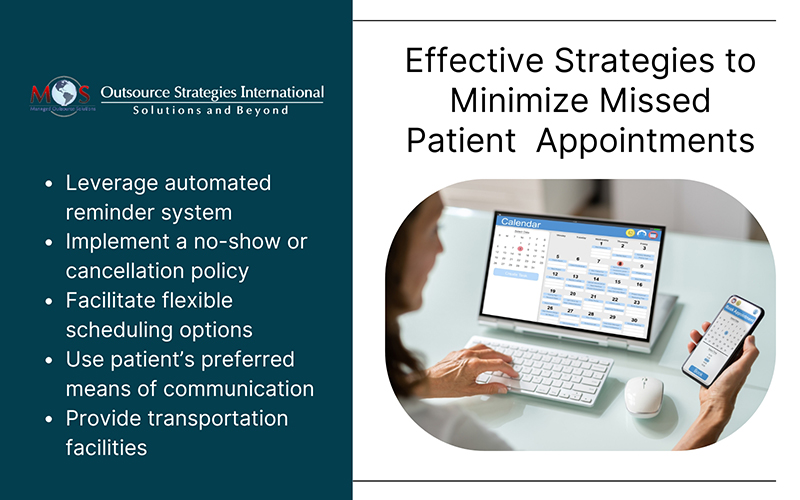A common misconception is that missed patient appointments free up time for healthcare professionals to complete other tasks. In reality, missed appointments lead to disruptions in the carefully orchestrated routine of a medical practice. Healthcare providers depend on tightly scheduled time slots to conduct consultations, attend follow-up visits, and coordinate with other departments. So, when a patient misses an appointment, this time is often too short to be repurposed for other productive activities, especially if the appointment requires specialized care or equipment.
A study published in the Journal of Medical Practice Management estimated that missed appointments result in an annual financial loss of around $150 billion for the healthcare sector. These no-shows and cancellations not only create operational inefficiency, but also result in significant financial losses for practices. One effective way to reduce cancellations and improve attendance is by utilizing the services of revenue cycle management and coding professionals for your practice. They can help reduce no-shows and cancellations by sending automated reminders, confirmations, and follow-ups. By streamlining payment processes, they also address financial concerns, encouraging patients to keep their appointments and improving overall attendance, which ultimately boosts practice revenue and efficiency.
Why Do Patients Miss Their Appointments?
Understanding the underlying reasons why patients miss their appointments is essential for developing effective solutions to prevent cancellations and no-shows in healthcare:
Here are some of the key factors that often contribute to missed appointments:
- Forgetfulness: One of the most common reasons patients cite for no-shows is the general forgetfulness, especially when the appointment was booked far in advance.
- Lack of transportation: Transportation issues, such as lack of reliable transportation, limited physical mobility, and transportation costs, may prevent patients from attending, particularly in areas with socioeconomic barriers.
- Health issues: Occasionally, patients may experience sudden health problems that require urgent care, or the health issue that necessitated the appointment might prevent them from attending.
- Financial Barriers: Some patients may not be financially equipped to cover the overall healthcare expenses, such as transportation, consultation fees, missed wages due to time off from work, or health insurance co-payments.
- Poor communication: Misunderstandings about schedule details such as date, time, or location due to late reminders or unclear information from the provider – can result in no-shows.
- Dissatisfaction with care: Patients may simply be dissatisfied with the care provided, whether due to past negative experience, long wait times, or poor service quality, and be compelled to cancel and seek care from another provider.
- Time conflicts: Scheduling conflicts with work, school, or family responsibilities, can make it difficult for patients to attend appointments.
- Fear or anxiety: Some patients may intentionally skip appointments due to fear or anxiety related to medical procedures, test results, or the healthcare environment, especially in certain specialties such as dentistry.
Check out our podcast on how to reduce missed patient appointments
Key Consequences of No-shows and Cancellations
Even though no-shows and cancellations are common challenges faced by healthcare providers, their consequences are severe and far-reaching. These disruptions not only hinder the delivery of timely care but also have significant financial, operational, and administrative burden on practices. The negative effects of missed appointments can include:
- Financial Impact: No-shows and cancellations can cause financial strain for healthcare practices, due to lost revenue, increased operational costs, and tight margin.
- Disruption of Care Continuity: Missed appointments can delay necessary treatments, leading to interruptions in the patient’s treatment plan and potentially worsening health conditions, especially for patients with chronic conditions.
- Wasted Resources: Time, staffing, and medical resources are often wasted on preparing for an appointment that doesn’t take place.
- Decreased Availability for New Patients: Frequent cancellations create empty time slots that could have been filled by other patients, reducing the practice’s ability to serve new or urgent patients in need of care.
- Increased Healthcare Costs: Missed appointments may lead to higher overall healthcare costs, as practices may need to allocate resources to follow-up, rescheduling, and managing the impact of cancellations.
Unlock higher patient attendance and maximize your practice’s revenue potential with our medical billing services!
Tangible Solutions to Reduce No-show Rates and Cancellations
There are several practical, evidence-based strategies that practices can implement while facing high no-show rates and cancellations:
- Leverage Automated Reminder System
Implementing automated reminder systems is a strategic approach to significantly reduce no-shows and manual administrative tasks in your practice. Automation streamlines the reminder process by sending personalized notifications at strategically timed intervals. By leveraging multiple communication channels such as texts, emails, and phone calls, patients are constantly reminded of their upcoming appointments. Furthermore, automated confirmation requests ensure that patients can easily confirm or reschedule their appointments, improving scheduling accuracy.
- Implement a No-Show or Cancellation Policy
Sometimes, a financial incentive can encourage patients to take their appointments seriously. Introducing a consultation, no-show, and cancellation fee (especially for last-minute cancellations) can foster a sense of accountability for patients. While this strategy should be used thoughtfully to avoid alienating patients, it can serve as a deterrent to casual cancellations. However, even with a well-structured and clear cancellation policy in place, many patients are often unaware of the details. To mitigate this, practices should prominently display their cancellation policy across multiple touchpoints, such as in the waiting area, on booking platforms, in confirmation emails, and on patient portals.
- Facilitate Flexible Scheduling Options
Providing flexible scheduling options helps to accommodate the varying needs of patients. Simplify the scheduling process by providing a range of appointment tools, including online booking, offline scheduling alternatives, and extended hours during evenings or weekends. This will give patients greater flexibility, enabling them to manage schedules at times that best align with their personal itinerary.
- Use the Patient’s Preferred Means of Communication
Modern patients value autonomy and transparency in their healthcare journey, expecting communication through their preferred channels. By proactively inquiring about patients’ preferred contact methods—whether via phone, text, or email—healthcare practices can effectively reduce no-show rates and cancellations through personalized reminders and outreach. Personalizing communication with patient details such as name, date, and provider’s name, increases patient engagement.
- Provide Transportation Facilities
Healthcare providers can help overcome socio economic barriers to attendance by ensuring transportation services are available at their practice. Many patients may miss their scheduled visits due to challenges such as long travel distances, high transportation costs, and limited access to reliable public transit. This initiative is particularly valuable for vulnerable groups, including the elderly, those with mobility challenges, and individuals who face transportation difficulties. By overcoming transportation barriers for healthcare appointments and providing accessible transportation options, practices can significantly improve patient attendance, ensuring that care is not delayed or neglected.

Maximize Patient Attendance with Outsourcing
Utilizing healthcare reimbursement solutions can be a highly effective strategy for enhancing practice attendance by streamlining appointment scheduling, reminders, and follow-ups. By leveraging external support, healthcare practices can ensure that patient appointments are confirmed, rescheduled, and followed up in a timely and consistent manner. Outsourcing administrative tasks, such as appointment reminders through phone calls, text messages, or emails, reduces the burden on in-house staff, allowing them to focus on patient care.
Additionally, it can also help practices implement more efficient systems for managing cancellations and no-shows, ultimately improving patient attendance rates. This not only boosts operational efficiency but also reduces the financial losses associated with missed appointments. By outsourcing, practices can benefit from increased patient engagement, optimized workflow, and consistent attendance, resulting in better patient outcomes and increased revenue.




